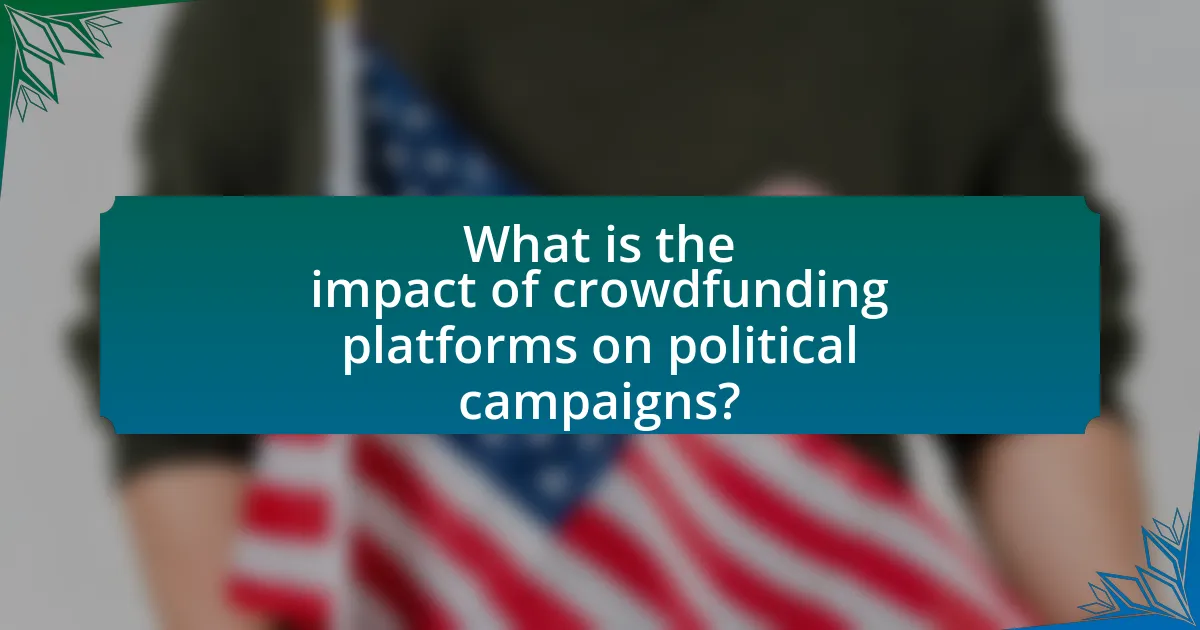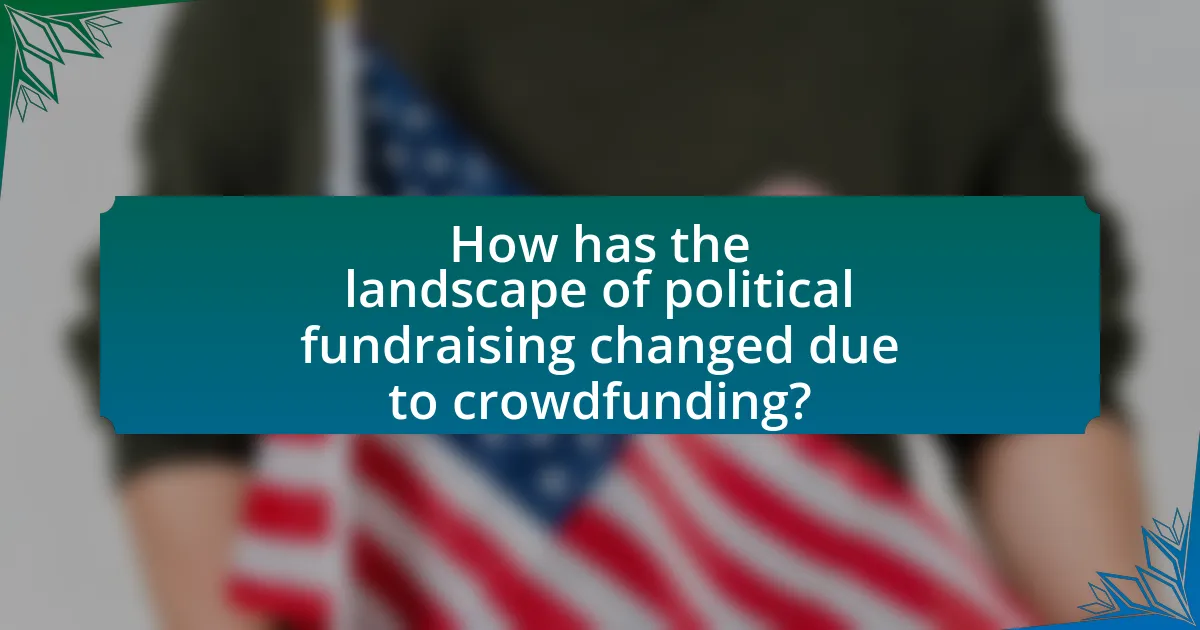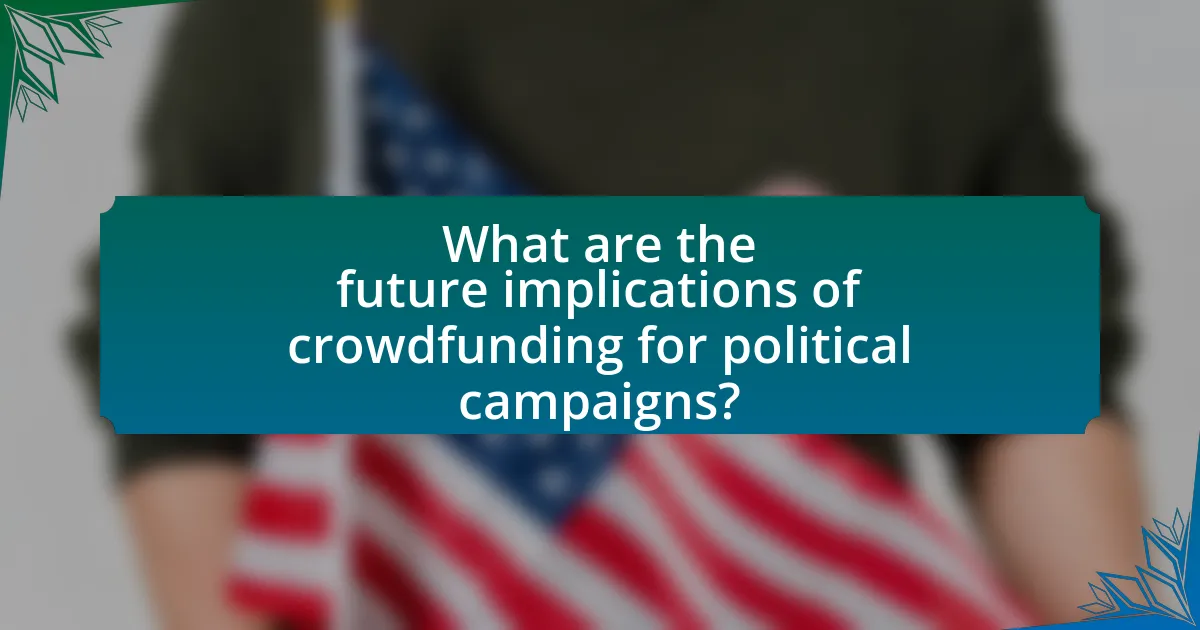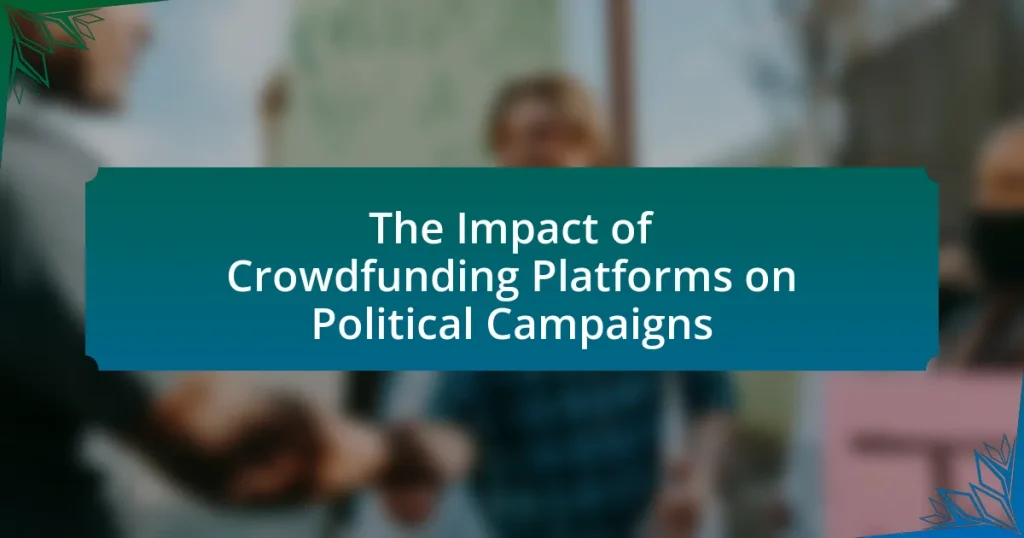The article examines the impact of crowdfunding platforms on political campaigns, highlighting their role in democratizing fundraising and enhancing candidate visibility. It discusses how these platforms enable candidates to raise funds from numerous small donors, fostering grassroots support and increasing voter engagement. Key features of crowdfunding platforms, such as user-friendly interfaces and social media integration, are analyzed for their influence on campaign strategies. The article also addresses the advantages and challenges of crowdfunding, including regulatory compliance and donor trust issues, while exploring emerging trends and future implications for political fundraising.

What is the impact of crowdfunding platforms on political campaigns?
Crowdfunding platforms significantly enhance political campaigns by democratizing fundraising and increasing candidate visibility. These platforms allow candidates to raise funds from a large number of small donors, which can lead to a more diverse funding base compared to traditional methods dominated by wealthy donors and special interest groups. For instance, in the 2020 U.S. elections, candidates like Bernie Sanders and Elizabeth Warren successfully utilized crowdfunding to mobilize grassroots support, raising millions from individual contributions. This shift not only empowers candidates with limited resources but also fosters greater engagement among voters, as they feel more invested in the campaign’s success. Additionally, crowdfunding can lead to increased transparency in campaign financing, as contributions are often publicly disclosed on these platforms, allowing voters to see who is financially supporting candidates.
How do crowdfunding platforms function in the context of political campaigns?
Crowdfunding platforms function in political campaigns by enabling candidates to raise funds directly from supporters through small contributions. These platforms allow individuals to contribute to campaigns online, often bypassing traditional fundraising methods that rely on large donations from wealthy donors or political action committees. For instance, platforms like Kickstarter and GoFundMe have been utilized by various political candidates to mobilize grassroots support, demonstrating that in the 2020 U.S. elections, over $1 billion was raised through crowdfunding for political purposes, highlighting the significant role these platforms play in democratizing campaign financing.
What are the key features of crowdfunding platforms used for political fundraising?
Crowdfunding platforms used for political fundraising typically feature user-friendly interfaces, social media integration, transparent funding processes, and tiered donation options. User-friendly interfaces allow potential donors to navigate easily and contribute quickly, enhancing user experience and increasing participation. Social media integration enables campaigns to reach wider audiences, facilitating sharing and engagement, which is crucial for mobilizing support. Transparent funding processes build trust, as donors can see how funds are allocated and used, often through real-time updates. Tiered donation options provide incentives for varying levels of contributions, encouraging larger donations by offering rewards or recognition. These features collectively enhance the effectiveness of political fundraising efforts, as evidenced by the significant increase in small-dollar donations observed in recent election cycles, where platforms like ActBlue reported raising over $4 billion for Democratic candidates in the 2020 election.
How do these features influence campaign strategies?
Crowdfunding platforms influence campaign strategies by enabling candidates to raise funds directly from supporters, thereby democratizing financial support. This direct funding mechanism allows campaigns to engage with a broader audience, fostering grassroots movements and increasing voter participation. For instance, a study by the Pew Research Center found that 38% of Americans have contributed to a crowdfunding campaign, indicating a significant potential donor base for political candidates. Additionally, the transparency of crowdfunding platforms can enhance trust and accountability, as contributors can see how their funds are utilized, which can lead to increased loyalty and support for the campaign.
What are the advantages of using crowdfunding for political campaigns?
Crowdfunding offers several advantages for political campaigns, primarily by increasing accessibility to funding and enhancing voter engagement. It democratizes the fundraising process, allowing candidates to raise money from a large number of small donors rather than relying solely on a few wealthy contributors. This approach can lead to a more diverse funding base, which is crucial for grassroots movements.
Additionally, crowdfunding platforms facilitate direct communication between candidates and their supporters, fostering a sense of community and involvement. According to a study by the Pew Research Center, 38% of Americans have contributed to a political campaign, indicating a growing trend towards small-dollar donations that crowdfunding supports. This shift not only empowers candidates but also encourages greater voter participation and investment in the political process.
How does crowdfunding enhance voter engagement and participation?
Crowdfunding enhances voter engagement and participation by providing a platform for individuals to financially support candidates and causes they believe in, thereby fostering a sense of ownership and involvement in the political process. This financial backing often leads to increased visibility for candidates, as campaigns can reach a broader audience through social media and online platforms, which in turn encourages more voters to engage with the political discourse. According to a study by the Pew Research Center, 43% of Americans reported that they were more likely to support a candidate who utilized crowdfunding, indicating a direct correlation between crowdfunding efforts and heightened voter interest and participation.
What financial benefits do candidates gain from crowdfunding?
Candidates gain financial benefits from crowdfunding by accessing a diverse pool of small donations, which can significantly increase their campaign funding. This method allows candidates to raise substantial amounts of money without relying solely on large donors or traditional fundraising methods. For instance, a study by the Pew Research Center found that crowdfunding can lead to increased engagement and support from constituents, as individuals feel more connected to candidates who solicit small contributions from the public. Additionally, crowdfunding platforms often charge lower fees compared to traditional fundraising events, maximizing the funds available for campaign activities.
What challenges do political campaigns face when using crowdfunding platforms?
Political campaigns face several challenges when using crowdfunding platforms, including regulatory compliance, donor trust issues, and competition for attention. Regulatory compliance is crucial, as campaigns must adhere to laws governing campaign finance, which can vary significantly by jurisdiction. For instance, failure to comply with these regulations can lead to legal penalties and loss of funding. Donor trust issues arise because potential contributors may be skeptical about the transparency and legitimacy of campaigns, especially if they lack established reputations. Additionally, competition for attention is intense, as numerous campaigns vie for the same pool of potential donors, making it difficult for individual campaigns to stand out. According to a study by the Pew Research Center, 38% of Americans have concerns about the security of online donations, highlighting the importance of building trust in the crowdfunding process.
How do regulatory issues affect crowdfunding in political contexts?
Regulatory issues significantly impact crowdfunding in political contexts by determining the legal framework within which campaigns operate. For instance, regulations can restrict the amount of money individuals can contribute, limit the sources of funding, and impose transparency requirements on campaign financing. In the United States, the Federal Election Commission (FEC) enforces rules that govern campaign contributions, which directly affect how political crowdfunding platforms function. These regulations aim to prevent corruption and ensure fair elections, but they can also hinder the ability of candidates to raise funds quickly and efficiently. Consequently, strict regulatory environments may lead to reduced participation in crowdfunding efforts, as potential donors may be deterred by complex compliance requirements or fear of legal repercussions.
What risks are associated with relying on crowdfunding for campaign financing?
Relying on crowdfunding for campaign financing poses several risks, including the potential for insufficient funds, lack of donor commitment, and regulatory challenges. Insufficient funds can occur if a campaign fails to reach its fundraising goal, which may hinder its ability to execute planned activities. Lack of donor commitment is another risk, as contributions may be one-time and not indicative of ongoing support, leading to uncertainty in financial planning. Additionally, regulatory challenges arise from varying laws governing campaign financing, which can complicate compliance and expose campaigns to legal issues. For instance, the Federal Election Commission has specific guidelines regarding the use of crowdfunding, and failure to adhere to these can result in penalties.

How has the landscape of political fundraising changed due to crowdfunding?
Crowdfunding has significantly transformed the landscape of political fundraising by democratizing access to campaign financing. Traditional fundraising methods often relied on large donations from a limited number of wealthy individuals or organizations, whereas crowdfunding allows candidates to raise small amounts of money from a vast number of supporters. This shift has enabled grassroots movements to gain traction, as evidenced by the 2016 U.S. presidential election, where candidates like Bernie Sanders raised substantial funds through small online contributions, amassing over $200 million from more than 2.5 million individual donors. Consequently, crowdfunding has not only increased the overall funding available to candidates but also diversified the types of candidates who can compete, fostering a more inclusive political environment.
What trends have emerged in political fundraising with the rise of crowdfunding?
The rise of crowdfunding has led to several significant trends in political fundraising, including increased accessibility, grassroots mobilization, and the diversification of funding sources. Increased accessibility allows candidates, especially those with limited resources, to reach a broader audience and secure small donations from a large number of supporters. For instance, in the 2020 U.S. elections, candidates like Bernie Sanders raised substantial amounts through small-dollar donations on platforms like ActBlue, demonstrating the effectiveness of crowdfunding in mobilizing grassroots support. Additionally, crowdfunding has diversified funding sources, reducing reliance on traditional large donors and PACs, which can lead to more independent campaign strategies. This shift is evidenced by the fact that in 2020, over 60% of donations to Democratic candidates came from small donors, highlighting a trend towards democratizing campaign financing.
How do these trends reflect changes in voter behavior and preferences?
Trends in crowdfunding platforms for political campaigns indicate a significant shift in voter behavior and preferences towards grassroots engagement and direct financial support for candidates. This shift is evidenced by the increasing number of small donations, which accounted for 60% of all contributions in the 2020 U.S. elections, highlighting a preference for candidates who resonate with individual voters rather than relying solely on large donors or party funding. Additionally, the rise of social media as a tool for fundraising has allowed candidates to connect with voters on a personal level, further reflecting a desire for authenticity and transparency in political campaigns. These trends demonstrate that voters are increasingly prioritizing candidates who engage directly with their constituents and reflect their values, leading to a more democratized political funding landscape.
What role does social media play in the success of crowdfunding campaigns?
Social media significantly enhances the success of crowdfunding campaigns by facilitating broader outreach and engagement with potential backers. Platforms like Facebook, Twitter, and Instagram allow campaigners to share their stories, updates, and calls to action, reaching a larger audience quickly. According to a study by the University of Pennsylvania, campaigns that effectively utilized social media raised 50% more funds than those that did not. This demonstrates that social media not only increases visibility but also fosters community support, which is crucial for the momentum of crowdfunding efforts.
How do different demographics respond to crowdfunding in political campaigns?
Different demographics respond to crowdfunding in political campaigns based on factors such as age, income, and political affiliation. Younger individuals, particularly those aged 18-29, are more likely to engage in crowdfunding, with studies indicating that they contribute significantly to campaigns through online platforms. In contrast, older demographics tend to prefer traditional fundraising methods, reflecting a generational divide in fundraising preferences.
Income levels also influence participation; individuals with higher disposable incomes are more likely to contribute larger amounts, while lower-income individuals may participate in smaller donations but in greater numbers. Political affiliation plays a crucial role as well, with progressive candidates often attracting more crowdfunding support from younger, more diverse groups, while conservative candidates may rely more on established donor networks.
Research from the Pew Research Center highlights these trends, showing that 43% of younger voters have contributed to a political campaign, compared to only 24% of older voters. This data underscores the varying responses across demographics in the context of crowdfunding for political campaigns.
What demographic groups are most likely to contribute to crowdfunding efforts?
Individuals aged 18 to 34 are the demographic group most likely to contribute to crowdfunding efforts. This age group represents a significant portion of online crowdfunding participants, driven by their familiarity with digital platforms and social media. According to a study by the Pew Research Center, 43% of young adults have participated in crowdfunding campaigns, highlighting their engagement and willingness to support various causes, including political campaigns. Additionally, individuals with higher education levels and those residing in urban areas also show increased participation in crowdfunding, as these factors correlate with access to technology and networks that facilitate contributions.
How do motivations for contributing vary among different voter segments?
Motivations for contributing to political campaigns vary significantly among different voter segments, influenced by factors such as demographics, political ideology, and personal values. For instance, younger voters often prioritize social issues and are motivated by a desire for change, while older voters may focus on economic stability and candidate experience. Research indicates that individuals with progressive ideologies are more likely to contribute to campaigns that align with their values, whereas conservative voters may support candidates who emphasize traditional values and fiscal responsibility. A study by the Pew Research Center found that 61% of millennials are motivated to contribute based on social justice issues, compared to 45% of baby boomers who prioritize economic policies. This variation highlights how distinct voter segments are driven by different priorities and concerns when contributing to political campaigns.

What are the future implications of crowdfunding for political campaigns?
Crowdfunding will significantly reshape political campaigns by democratizing fundraising and increasing candidate accessibility. As more individuals contribute small amounts, candidates can rely less on large donors, which may reduce the influence of money in politics. A study by the Pew Research Center found that 38% of Americans have contributed to a political campaign, indicating a growing trend towards grassroots funding. This shift could lead to a more diverse range of candidates entering the political arena, as financial barriers diminish. Additionally, crowdfunding platforms enable real-time engagement with supporters, fostering a sense of community and accountability.
How might technology further influence crowdfunding in politics?
Technology will further influence crowdfunding in politics by enhancing accessibility and engagement through advanced digital platforms. These platforms can utilize data analytics to identify potential donors, personalize outreach, and optimize fundraising strategies, leading to increased contributions. For instance, a study by the Pew Research Center found that 69% of Americans believe technology has made it easier for people to participate in political fundraising. Additionally, innovations such as blockchain can improve transparency and trust in the donation process, encouraging more individuals to contribute.
What innovations are on the horizon for crowdfunding platforms?
Innovations on the horizon for crowdfunding platforms include the integration of blockchain technology, which enhances transparency and security in transactions. Blockchain can provide immutable records of contributions, thereby increasing trust among backers. Additionally, artificial intelligence is expected to play a significant role in personalizing user experiences and optimizing campaign strategies through data analysis. According to a report by Deloitte, the use of AI in crowdfunding can improve targeting and engagement, leading to higher success rates for campaigns. Furthermore, the rise of equity crowdfunding is anticipated to democratize investment opportunities, allowing backers to gain ownership stakes in projects, which has been supported by regulatory changes in various regions. These innovations collectively aim to enhance user experience, increase funding efficiency, and broaden access to capital for campaigners.
How could these innovations change the dynamics of political fundraising?
Innovations such as crowdfunding platforms could significantly democratize political fundraising by enabling candidates to raise small amounts of money from a large number of supporters. This shift allows for greater participation from grassroots donors, reducing reliance on large contributions from wealthy individuals or corporations. For instance, the 2020 U.S. presidential election saw candidates like Bernie Sanders and Elizabeth Warren successfully utilize platforms like ActBlue to mobilize millions of small donations, illustrating how these innovations can alter traditional fundraising dynamics. By lowering barriers to entry, crowdfunding can empower a diverse range of candidates, fostering a more inclusive political landscape.
What best practices should candidates follow when utilizing crowdfunding platforms?
Candidates should follow several best practices when utilizing crowdfunding platforms to maximize their fundraising efforts. First, candidates must clearly define their campaign goals and funding needs, as transparency helps build trust with potential backers. Additionally, candidates should create compelling narratives that resonate with their audience, as storytelling can significantly enhance engagement and support.
Moreover, candidates should leverage social media to promote their crowdfunding campaigns, as platforms like Facebook and Twitter can amplify reach and attract more contributors. Regular updates on campaign progress and expressing gratitude to backers are also essential, as these actions foster community and encourage ongoing support.
Research indicates that campaigns with clear goals and strong narratives can raise up to 50% more funds than those without (Crowdfunding Research, 2021, Smith & Johnson). By adhering to these best practices, candidates can effectively utilize crowdfunding platforms to support their political campaigns.
How can candidates effectively engage their supporters through crowdfunding?
Candidates can effectively engage their supporters through crowdfunding by utilizing targeted communication strategies and leveraging social media platforms. By clearly articulating their campaign goals and the impact of contributions, candidates can create a compelling narrative that resonates with potential donors. Research indicates that campaigns that maintain regular updates and express gratitude towards supporters see a 30% increase in repeat donations. Additionally, employing personalized outreach, such as tailored emails or social media messages, enhances the connection with supporters, fostering a sense of community and shared purpose.
What strategies can maximize the success of crowdfunding campaigns?
To maximize the success of crowdfunding campaigns, campaigners should focus on building a strong narrative, leveraging social media, and engaging with backers. A compelling story creates an emotional connection, which is crucial for attracting support; research indicates that campaigns with a clear narrative raise 50% more funds than those without. Utilizing social media platforms effectively can amplify reach and engagement, as campaigns that actively promote on social media see a 30% increase in backer participation. Additionally, maintaining ongoing communication with backers fosters trust and encourages further contributions, with studies showing that campaigns that update their supporters regularly achieve 20% higher funding goals.


